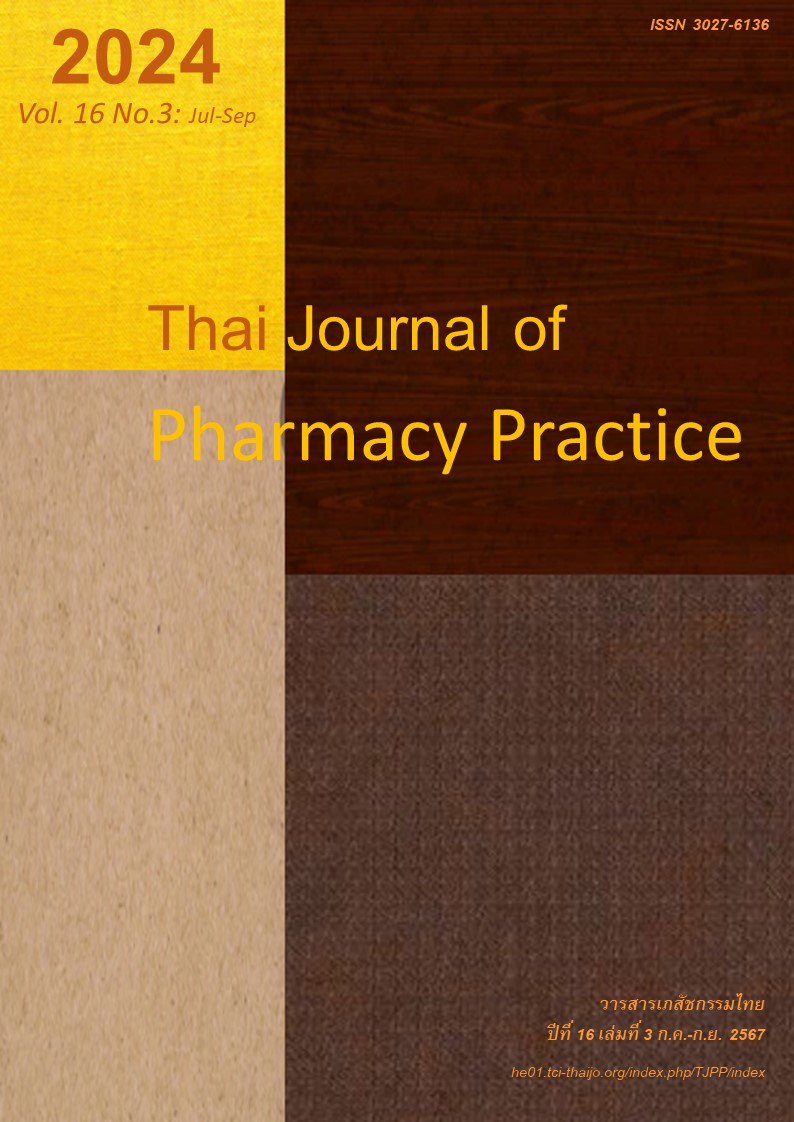การพัฒนาคุณภาพการจัดการข้อมูลยาของโรงพยาบาลภายในจังหวัดนราธิวาส : กรณีศึกษาตัวชี้วัดการใช้ยาปฏิชีวนะอย่างสมเหตุผล
Main Article Content
บทคัดย่อ
วัตถุประสงค์: วิเคราะห์หาสาเหตุของความไม่สอดคล้องกันของข้อมูลตัวชี้วัดการใช้ยาปฏิชีวนะอย่างสมเหตุสมผลที่รายงานจากระบบสารสนเทศของกระทรวงสาธารณสุข (Health Data Center: HDC) และจากระบบรายงานเฉพาะกิจที่พัฒนาขึ้นโดยเฉพาะในพื้นที่ และพัฒนาแนวทางการจัดการข้อมูลอย่างเป็นระบบให้เป็นที่ยอมรับร่วมกันเพื่อแก้ปัญหาความไม่สอดคล้องกันของข้อมูล วิธีการ: การวิจัยนี้เป็นการวิจัยเชิงปฏิบัติการซึ่งแบ่งออกเป็น 3 ระยะ คือ ระยะที่ 1 เป็นการหาสาเหตุของความไม่สอดคล้องกันของค่าตัวชี้วัดโดยการวิเคราะห์ข้อมูลทุติยภูมิ การศึกษาจากเอกสาร การสัมภาษณ์เชิงลึกกับผู้รับผิดชอบตัวชี้วัดและผู้ดูแลระบบสารสนเทศ ระยะที่ 2 เป็นการสังเคราะห์แนวทางการจัดการข้อมูลอย่างยั่งยืนโดยการประชุมกลุ่มร่วมกับผู้รับผิดชอบตัวชี้วัดและผู้ดูแลระบบสารสนเทศ และระยะที่ 3 คือการทดสอบประสิทธิผลเบื้องต้นของแนวทางที่พัฒนาขึ้น โดยนำแนวทางการจัดการข้อมูลที่พัฒนาขึ้นไปดำเนินการจริงในโรงพยาบาลที่สมัครใจ ผลการวิจัย: ความไม่สอดคล้องกันส่วนใหญ่ของค่าตัวชี้วัดในการศึกษา เกิดในขั้นตอนการนำเข้ามูลดิบทั้งในส่วนของการให้รหัสยาและรหัสโรค ซึ่งเมื่อนำไปประมวลผลค่าตัวชี้วัดในระบบ HDC จึงไม่ตรงกับความจริง การทำงานของระบบรายงานเฉพาะกิจได้เพิ่มขั้นตอนการทำความสะอาดข้อมูลดิบโดยผู้รับผิดชอบตัวชี้วัด ด้วยการกรองข้อมูลดิบบางส่วนออกก่อนที่จะนำไปประมวลผลค่าตัวชี้วัด จึงเพิ่มสาเหตุของความไม่สอดคล้องของค่าตัวชี้วัดจากความผิดพลาดของมนุษย์ ประกอบกับชุดคำสั่งที่ใช้ประมวลผลค่าตัวชี้วัดขาดการปรับปรุงให้ทันสมัยจึงไม่สอดคล้องตามนิยามของตัวชี้วัดที่เปลี่ยนแปลงไป ในขณะที่ระบบ HDC ไม่มีการดึงข้อมูลดิบออกจากระบบมากรองออกโดยมนุษย์ และชุดคำสั่งประมวลผลตัวชี้วัดมีความถูกต้องตามนิยามของตัวชี้วัดที่เปลี่ยนแปลงไป แนวทางหลักของการจัดการข้อมูลเพื่อแก้ปัญหาดังกล่าวในการวิจัยนี้ คือ การทำให้มีระบบรายงานเพียงระบบเดียว คือระบบ HDC โดยพัฒนาแนวทางจัดการข้อมูลดิบต้นทางให้มีคุณภาพสูงขึ้น จากการทดสอบแนวทางการจัดการข้อมูลที่พัฒนาขึ้น ส่งผลให้ข้อมูลดิบเข้าสู่ระบบ HDC มีปริมาณ และคุณภาพสูงขึ้น โดยความผิดพลาดในการให้รหัสยาลดลงเหลือ 0 ความผิดพลาดจากการให้รหัส ICD-10 ลดลง ระยะเวลาในการตรวจสอบเวชระเบียนลดลงจาก 7 วัน เหลือ 4-5 วัน ความล่าช้าของการส่งข้อมูลลดลงจาก 21-30 วันเหลือ 5-7 วัน สรุป: สาเหตุหลักของความไม่สอดคล้องกันของค่าตัวชี้วัดในการศึกษา เกิดขึ้นในขั้นตอนการนำเข้าข้อมูลดิบเข้าสู่ฐานข้อมูลของโรงพยาบาล ทำให้เกิดระบบการรายงานคู่ขนานที่ต้องใช้เจ้าหน้าที่ทำความสะอาดข้อมูลด้วยการกรองข้อมูลดิบบางส่วนออกก่อนที่จะประมวลผลค่าตัวชี้วัด ซึ่งเป็นการเพิ่มความผิดพลาดจากมนุษย์ และเป็นการทำงานที่เป็นภาระและซ้ำซ้อน การพัฒนาแนวทางการจัดการคุณภาพข้อมูลดิบต้นน้ำอย่างเป็นระบบเป็นที่ยอมรับจากทุกฝ่ายที่เกี่ยวข้อง เพื่อให้มีระบบรายงานเพียงระบบเดียว ถือเป็นการจัดการปัญหาที่มีประสิทธิผล
Article Details

อนุญาตภายใต้เงื่อนไข Creative Commons Attribution-NonCommercial-NoDerivatives 4.0 International License.
ผลการวิจัยและความคิดเห็นที่ปรากฏในบทความถือเป็นความคิดเห็นและอยู่ในความรับผิดชอบของผู้นิพนธ์ มิใช่ความเห็นหรือความรับผิดชอบของกองบรรณาธิการ หรือคณะเภสัชศาสตร์ มหาวิทยาลัยสงขลานครินทร์ ทั้งนี้ไม่รวมความผิดพลาดอันเกิดจากการพิมพ์ บทความที่ได้รับการเผยแพร่โดยวารสารเภสัชกรรมไทยถือเป็นสิทธิ์ของวารสารฯ
เอกสารอ้างอิง
Holloway K, Dijk VL. The world medicines situation 2011: rational use of medicines. 3rd ed. Geneva: World Health Organization; 2011.
Kshirsagar NA. Rational use of medicines: Cost consideration & way forward. Indian J Med Res 2016; 144: 502-05. doi: 10.4103/0971-5916.200901.
Tunpaiboon N. Business/Industry outlook 2021-2023: pharmaceutical industry [online]. 2021 [cited Feb 4, 2023]. Available from: www.krungsri.com/th /research/industry/industry-outlook/Chemicals/pham aceuticals/IO/io-pharmaceuticals-21.
World Health Assembly. Progress in the rational use of medicines: report by the Secretariat. Geneva: World Health Organization; 2007.
National Antimicrobial Resistant Surveillance Center Thailand. The situation of antibiotic resistance in Thailand [online]. 2013 [cited Feb 4, 2023]. Available from: narst.dmsc.moph.go.th/news001.html.
Ministry of Public Health. Thailand antimicrobial resistance management strategic plan 2017-2021 [online]. 2017 [cited Feb 4, 2023]. Available from: amrthailand.net/Nps.
National Health Security Office Region 12. Guidelines for managing expenditures according to service quality criteria for fiscal year 2020 [online]. 2020 [cited Feb 4, 2023]. Available from: hdc-mkho.moph. go.th/download/DOC/QRCODE/2020-02-28/.
Xie C, Gao J,Tao C. Big data validation case study. IEEE third international conference on big data computing service and applications; 2017 May 26-28; California, USA. p. 281-286.
Ministry of Public Health. Introduction to health Information systems 43 HDC files [online]. 2014 [cited Feb 4, 2023]. Available from: kkhdc.moph.go.th/down load/uploads/1532736578_17015.pdf.
Habusaya S, Ditcharoen Nadh. Analysis of ICD-10 coding errors in 43 files database systems for medical record department using data mining techniques, KKU Science Journal; 2020;1:142-155.
Saithong V. Guidelines for examining data in 43 files in HDC medical and health data warehouse system [online]. 2021 [cited Feb 4, 2023]. Available from: ict.dmh.go.th/events/events/files/HDC_Mental64_V.01.pdf.


